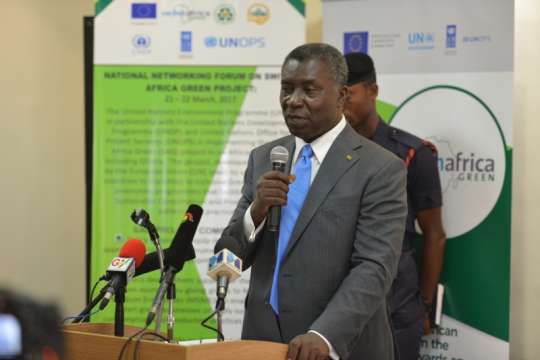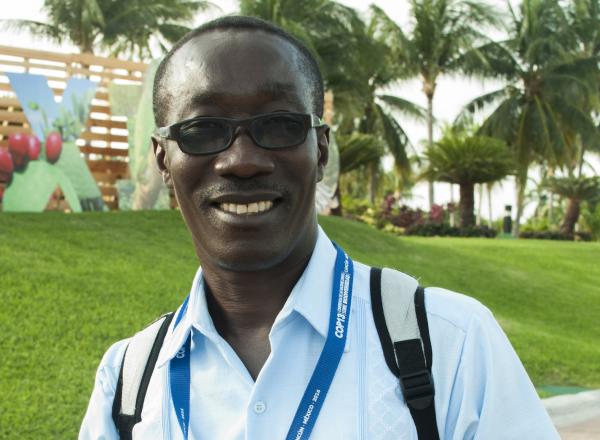
The debate over whether biotechnology applications are safe in food production has intensified in Ghana as the country prepares for its first commercial release of a genetically engineered (GE) crop in 2018.
Farmer associations, civil society organizations, government and other interest groups are all stepping up the rhetoric to turn the minds and hearts of Ghanaians for or against the technology, which Ghana s Council for Scientific and Industrial Research (CSIR) has insisted is harmless and a necessity to keep the country food secure. The CSIR recently published a full page opinion piece in the largest circulating national newspaper to drum home the point.
The latest such media war was sparked when the association of seed producing companies made a public declaration in support of the technology. The National Seed Trade Association of Ghana (NASTAG) announced in early September it will no longer sit on the sidelines and has decided to throw its weight behind ongoing plans by the government to commercialize GMO crops. NASTAG President Thomas Havor said the technology is crucial to help farmers deal effectively with pest attacks and the impact of climate change on the agricultural sector.
We believe GMO technology is the way to go, Havor said. The whole world is adopting the technology and Ghana should not be sitting on the fence. There is nothing unsafe about it We the seed producers will do our part to ensure the technology works.
Following Parliament s passage of the Biosafety Act 2011, the CSIR has been conducting field trials of some GMO seeds, as required by the regulatory process before they are introduced onto the market. The researchers have announced the GMO cowpea will be ready for commercialization next year following successful field trials. The trials have so far shown a drastic reduction in the use of pesticides, which the scientists say will help ensure environmental safety once farmers adopt it.
It is clear that the resistance to Maruca pests is there, disclosed Dr. Mumuni Abdulai, principal investigator of the research project. You can see it. We have invited farmers to see it, and they all testify that it is a very good material. It yields higher when you have the [Bt] gene in it than without the gene. Abdulai said the research work is at an advanced stage and the Bt cowpea seeds will be ready for release onto the market early next year.
According to Havor, the seed producers association is eagerly awaiting the completion of the trials so that it can help get the products onto the market. NASTAG is convinced Ghanaians will embrace the technology, despite claims by some civil society groups in the country that GMOs are unsafe.
Ghana will accept it, Havor said. Farmers will accept it. Once the education about the technology goes out to them, they will accept it The hesitance about GMOs is only because people do not understand it. But there is nothing unsafe about it.
The anti-GMO campaigning group Food Sovereignty Ghana responded with a strongly worded statement to the press, describing the declaration of support by NASTAG as unfortunate. Our simple response is that the concerns about GMOs are widespread and totally reasonable given the overwhelming quantum of independent research findings which question their safety for human health and expose their negative effects on the environment. Furthermore, Mr. Havor s assurances of the safety of GMOs run counter to the peer-reviewed publication in the European Network of Scientists for Social and Environmental Responsibilities, involving scientists, physicians, academics the group said. We strongly reject claims by GM seed developers and some scientists, commentators, and journalists that there is a scientific consensus on GMO safety
Despite the group s contention to the contrary, a wide range of credible scientific organizations, most notably the prestigious National Academies of Science, has determined that GMO crops are just as safe as their non-GMO counterparts.
Other organizations also have been vociferous in expressing their views on the technology, including the Ghana National Farmers and Fishermen Association. John Awuku Dziwornu, the group s vice president, declared recently: GMO is the best technology that will happen to agriculture in Ghana . It will help us deal with pests and drought and diseases on our farms and make farming a lot easier.
But a group representing small-holder farmers, the Peasant Farmers Association of Ghana, has taken the other side of the debate. The association has in the past led demonstrations alongside other civil society groups to demand a halt of the ongoing efforts to commercialize GMOs in the country, without success. Food Sovereignty Ghana even sued the government in the Human Rights Court, asking the judiciary to place a moratorium on the ongoing processes, but the case was thrown out two years ago.

Since the new administration took over the government in January of this year, it was unclear where the president and his team stood on the technology. But their policy position has now been clarified. During a public hearing on Sept. 22, Prof. Kwabena Frimpong Boateng, Ghana s Minister for Environment, Science and Technology, told Parliament s Public Accounts Committee that government is in support of responsible use of biotechnology as a key to dealing with the country s food security needs. He assured farmers their interests will be protected when the seeds eventually get to the market.
We will make sure that whatever genetic modification that comes will help us to maybe raise drought resistant seeds or seeds that will be resistant to certain pests and so on but not seeds that will make us dependent on an outside power for the things that we want to plant and eat, Frimpong Boateng noted.
Three days after his appearance in Parliament, Frimpong Boateng spoke at another public event and said GMOs are good technological systems that help improve crop and plant varieties, adding, Biotechnology is so important and we can t develop without it. Without mentioning names of target organizations and individuals, he also directed the board of the National Biosafety Authority (NBA) to increase education about the technology to help correct the wrong perception created in the minds of the public regarding the technology. He said Ghanaians have to embrace GMOs as a new way of technological advancement that had come to stay to help the world cope with weather changes, and that government sees great potential in modern biotechnology.
Meanwhile, government regulatory agencies now say they are also preparing themselves to ensure the rights and interests of both consumers and GMO seed producers are safeguarded when the novel seeds hit the market. When the NBA recently issued guidelines on the use of GMOs in the country to direct commercialization processes and general handling of GMOs, its Chief Executive Officer Eric Okoree said: The NBA is further putting in place measures to build the capacity needed to assess and make decisions on applications regarding general release of GMOs.
Joseph Opoku Gakpo is a Ghana-based journalist and a 2016 Alliance for Science Global Leadership Fellow.
